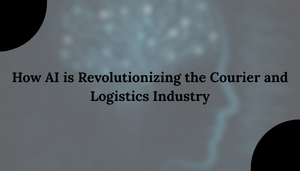How AI is Revolutionizing the Courier and Logistics Industry
Cuerpo
Artificial Intelligence (AI), once the subject of science fiction and academic research, has become one of the most transformative technologies of the 21st century. Born in the mid-20th century with the goal of simulating human intelligence in machines, AI has evolved from simple algorithms to sophisticated systems capable of learning, reasoning, and decision-making. Today, its impact spans nearly every industry—including the fast-paced world of courier and logistics services.
Courier services have always been about one core principle: speed and accuracy in delivery. From the early days of hand-delivered messages to today’s global next-day shipping networks, the industry has constantly pushed for faster and more efficient ways to move goods. Now, AI is helping courier companies elevate this mission by introducing intelligent automation, real-time optimization, and customer-centric solutions.
AI-Powered Route Optimization and Fleet Management
One of the most impactful applications of AI in courier services is dynamic route optimization. Traditional routing systems rely on static maps and pre-planned schedules. In contrast, AI algorithms analyze vast datasets—including traffic patterns, weather conditions, delivery time windows, and vehicle load capacities—to calculate the most efficient delivery routes in real-time.
This means couriers can avoid traffic jams, reduce fuel consumption, and make more deliveries in less time. Companies like UPS and FedEx have already implemented AI-powered logistics platforms to enhance their fleet efficiency, significantly lowering operational costs while improving delivery speed.
Fleet management has also been transformed by predictive maintenance powered by AI. By analyzing vehicle performance data, AI systems can anticipate mechanical issues before they occur. This allows for timely repairs, reduced breakdowns, and better utilization of delivery vehicles—leading to greater reliability across the network.
Enhancing Customer Experience Through AI
AI is also playing a crucial role in reshaping customer experience in the courier industry. Chatbots and virtual assistants are now commonly used on courier websites and apps, offering instant responses to customer queries regarding shipment status, delivery timelines, and service options. These AI-driven systems reduce the need for manual customer support and operate 24/7, enhancing accessibility and satisfaction.
Moreover, AI enables real-time parcel tracking and delivery forecasting. With machine learning models, courier services can predict delivery times more accurately, even accounting for unexpected disruptions. Customers are no longer kept in the dark—they receive automated updates on package location, estimated arrival, and delivery confirmations.
Some companies are even experimenting with AI-powered drones and autonomous delivery robots, which are expected to further transform last-mile delivery, especially in urban areas. These innovations aim to reduce human intervention, minimize delays, and expand delivery capabilities in high-demand regions.
Inventory Management and Smart Warehousing
AI also contributes significantly behind the scenes—in warehouses and fulfillment centers. With the help of AI, warehouses are becoming "smart" environments where robots and automated systems manage inventory with incredible speed and accuracy.
AI can forecast inventory needs based on historical demand trends, seasonal changes, and market behavior. This reduces overstocking or stockouts and helps courier companies ensure timely dispatch of packages. Vision-based AI systems also assist in scanning, sorting, and packing goods with precision, eliminating errors and expediting order processing.
Looking Ahead: The Future of Courier Services with AI
The integration of AI into courier services is still evolving, but the progress so far is impressive. As AI technology matures, we can expect even more innovative solutions. Predictive analytics will become more refined, drones and autonomous vehicles will become mainstream, and customer interactions will grow more personalized through natural language processing and sentiment analysis.
However, while AI promises increased efficiency and cost savings, human oversight remains essential—particularly for problem-solving, exception handling, and maintaining a customer-first approach. The future of courier services lies not in replacing humans, but in enabling them to work smarter with the support of AI.











Comentarios